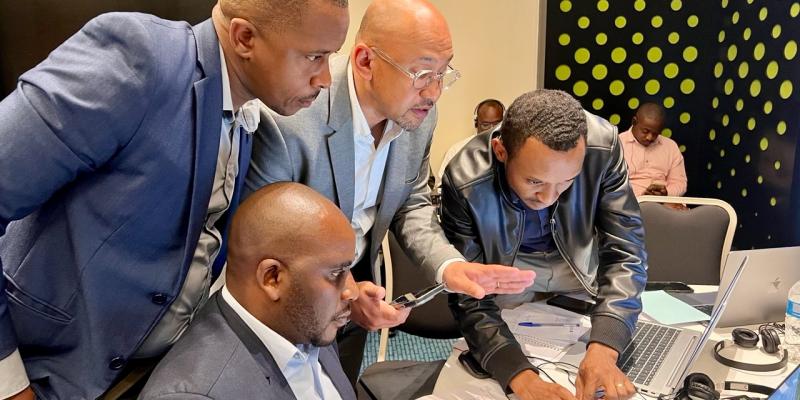Basel LEARN
Free eLearning courses, online training and more
Our online learning platform, Basel LEARN, is designed to help law enforcement, anti-money laundering and compliance professionals gain new skills to fight financial crime.
We offer these courses for free to support anti-corruption investigators, prosecutors and analysts around the world.
The interactive modules are self-paced and help you to “learn by doing” – for example, by completing tasks in a simulated investigation. After successfully completing a course, you will be awarded a Certificate of Completion.
Basel LEARN is also our base for virtual delivery of training courses by our International Centre for Asset Recovery and other teams.
Download a flyer about Basel LEARN in English, en español, em portugûes and en français.
Self-paced eLearning
We offer interactive online certificate courses to help practitioners gain key skills for anti-corruption and asset recovery work:
- Open-source Intelligence
-
Open-source intelligence (OSINT) is a central element of most corruption and money laundering investigations. The information and evidence you can gather from publicly available sources can make the difference between a successful investigation and a dead end. Through a simulated investigation, this course will help you learn the basics of how to prepare, conduct and report an OSINT undertaking.
- Introduction to OSINT and the intelligence cycle
- Preparing your research environment
- Searching the open web and deep web databases
- Analysing domain records to find information about websites
- Using cached and archived records to retrieve past versions of websites
- Gathering information from social media sites
- Exploiting the visual and meta information of images
- Searching online communities, investigating dark web pages and bitcoin
- Preparing a report of an OSINT investigation
During the course you immerse yourself in a simulated investigation into the fishing vessel FV Malaga and its owner, the organisation Mossaman Commodities. You follow open-source leads about the misuse of company structures that reveal indicators of illegal fishing and the smuggling of endangered animal parts.
The course was developed by our eLearning team in collaboration with subject matter experts from ICAR and our Green Corruption programme, with primary funding from PMI Impact.
Languages: English, Spanish, Portuguese, Bahasa Indonesia, Ukrainian, Bulgarian, Serbian, Albanian
Duration: 7 sessions; approximately 5 hours in total - Operational Analysis of Suspicious Transaction Reports
-
Analysing suspicious transactions for activities related to money laundering or the financing of terrorism is a core function of Financial Intelligence Units (FIUs).
In this course, you will learn to assess the risk of suspicious activity and analyse suspicious transaction reports (STRs).
This course was developed in co-operation with the Egmont Group of FIUs and is based on the content of the Egmont Group’s on-site Tactical Analysis training. It is aimed primarily at FIU analysts, but is useful for anyone analysing evidence as part of a financial investigation.
You will learn to
- Understand the core responsibilities of an FIU
- Differentiate between information and intelligence
- Assess the risk of suspicious activity
- Conduct an analysis of an STR, including all steps of the intelligence cycle: creating a collection plan and hypothesis, collecting, analysing and evaluating information, and creating and disseminating a report of your findings
Languages: English, Spanish, Portuguese, French, Ukrainian, Bulgarian, Chinese
Duration: 15 sessions; approximately 8 hours in total - Financial Analysis using Excel
-
For most investigators, Excel is the tool of choice to analyse financial information. In this course, you will use Excel to organise and analyse large volumes of data such as banking records, invoices, phone records and commercial transactions.
You will learn to:
- Protect your data from accidental changes
- Use simple functions to find transactions that stand out
- Unlock the power of filters to find exactly the data you are searching for
- Use subtotals to summarise your financial data instantly
- Create interactive summaries using PivotTables
You will also gain insight into typical patterns of illegal use of bank accounts, allowing you to further explore possibilities to analyse financial data.
Languages: English, Spanish, Portuguese, Ukrainian, Bulgarian, Serbian, Albanian
Duration: 9 sessions; approximately 3 hours in total - Visualising Cases and Flows of Money
-
Corruption and money laundering investigations often involve complex structures of persons, companies and other entities. This is challenging to present to a supervisor or colleagues, or even in a courtroom. A graph or diagram depicting the relationships between entitles in the case and the flows of money between them can make it easier for others to understand.
By using the free yEd software, you will learn how to:
- Create clear and interpretable graph to present entities in a case you are investigating
- Visualise meaningful connections between these entities
- Depict the entities with custom pictures
- Use layout functions to make your graph ready for analysing in a few clicks
- Use Excel data to create graphs that make financial flows comprehensible
- Add meaningful details, such as thicker connection lines to represent greater amounts of money
- Make your graph versatile, for example by exporting it to PowerPoint
Languages: English, Ukrainian, Bulgarian
Duration: 10 sessions; approximately 3 hours in total - Source and Application of Funds Analysis
-
The Source and Application of Funds Analysis is a simple yet powerful method to prove unknown or illegal income in a corruption or money laundering case when direct evidence is not available. It is also a crucial tool in cases of illicit enrichment in countries where this is criminalised.
You will learn to:
- Understand how indirect evidence like bank records can contribute to proving bribery and corruption cases and/or provide evidence in cases of illicit enrichment
- Calculate a suspect's unknown/illegal income using the Source and Application method
- Find “sources” and “applications” of funds in your case
- Use a simple Excel template that helps you to calculate the amount of unknown/illegal income
Languages: English, Spanish, Portuguese, Ukrainian, Bulgarian, Serbian, Albanian
Duration: 7 sessions; approximately 5 hours in total - Combating Terrorism Financing
-
Anti-money laundering and counter financing of terrorism (AML/CFT) systems and enforcement are strengthening around the world. It is essential for practitioners to have a clear and up-to-date understanding of terrorist financing threats, as well as how to identify, analyse and report them.
You will learn to:
- Understand the different actors involved in combating terrorist financing
- Understand the differences and similarities between money laundering and terrorist financing
- Explain why terrorist groups need funds and the different sources of those funds
- Research and gather information on terrorist groups
- Spot typical indicators of terrorist financing activity
- Create reports and visual graphs and disseminate these appropriately
This course was developed in co-operation with the Egmont Group of FIUs and is based on the content of the Egmont Group’s on-site Terrorist Financing training.
Languages: English, Spanish, Portuguese, French, Latvian
Duration: 8 sessions; approximately 5 hours in total - International Cooperation and Mutual Legal Assistance in Criminal Matters
-
Corruption and money laundering cases generally require investigative efforts beyond domestic borders. Why? A company paying bribes for a contract might be located in a foreign country. Perhaps assets acquired or used by the suspect are registered in a foreign company's name. A corrupt official may launder bribes in another jurisdiction. Successful international cooperation and the collection of information and evidence are key to a successful prosecution.
Through a simulated investigation into the public official "Daniel Regnard", you will gain the skills you need to collect and request information and evidence from international sources.
You will learn to:
- Understand the importance of international cooperation, the international channels you can use and the differences between them
- Use open-source information sources like company registries, newspaper articles, social media and company websites to gather information
- Request information informally via police-to-police and FIU-to-FIU channels
- Understand the principles and legal requirements of mutual legal assistance (MLA), and the admissibility of foreign evidence in domestic criminal proceedings
- Write effective MLA requests and respond to their refusal if needed
Languages: English, Spanish, Portuguese, French, Ukrainian, Bulgarian, Latvian, Serbian, Albanian
Duration: 10 sessions; approximately 5 hours in total - Data Cleaning and Harvesting
-
During investigations, you will often find documents in different formats, making data analysis difficult and progress a challenge. Learning new Excel techniques for data cleaning is an essential step to transform this "chaos" into a clear and organized format. Along with the data harvesting techniques you will learn in this course, you will be able to quickly identify suspicious transactions that might indicate illicit activity.
Take your skills to the next level by learning how to:
- Prepare financial documents for data analysis
- Apply Excel functions to fix formatting errors
- Identify additional sources of financial data
- Use OCR software to digitise hard copies and export data
- Scrape data from websites.
Languages: English
Duration: 8 sessions; approximately 4 hours in total - Collective Action Against Corruption
-
Collective Action is a powerful anti-corruption approach that brings businesses, civil society, and international stakeholders together to address shared corruption challenges and promote integrity and fair competition. This fully interactive course equips participants with the practical skills needed to conceptualise, establish, and implement Collective Action initiatives in diverse settings.
In this course, you will take on the role of Martha, a young entrepreneur in the fictional country of “Wakandaa.” Faced with a window of opportunity as the new government pledges to crack down on corruption, you will identify key stakeholders from the private sector, civil society, and the international community to join you in creating a Collective Action initiative. Together, you will explore the unique corruption challenges and work to promote fair business opportunities.
You will learn to:
- Identify and engage relevant stakeholders from the private sector, government, and civil society
- Understand the principles of Collective Action and how to apply them in anti-corruption efforts
- Navigate common challenges, such as managing conflicting stakeholder expectations and building trust
- Adapt to changing political and economic landscapes in the fight against corruption
- Develop and implement strategies for improving business integrity and fair competition
By the end of the course, you will have hands-on tools to build and lead successful Collective Action initiatives, addressing corruption challenges through collaboration and mutual trust.
This course is ideal for:
- Private sector professionals, including compliance officers, auditors, and risk managers
- Government representatives involved in anti-corruption or procurement initiatives
- Civil society and international organisations focused on transparency, accountability, and economic development
Languages: English
Duration: 11 sessions; approximately 4 hours in total
Want to know more about eLearning? Read this quick guide to eLearning for asset tracing and financial analysis by Peter Huppertz, who leads the Basel Institute’s IT and eLearning development.




